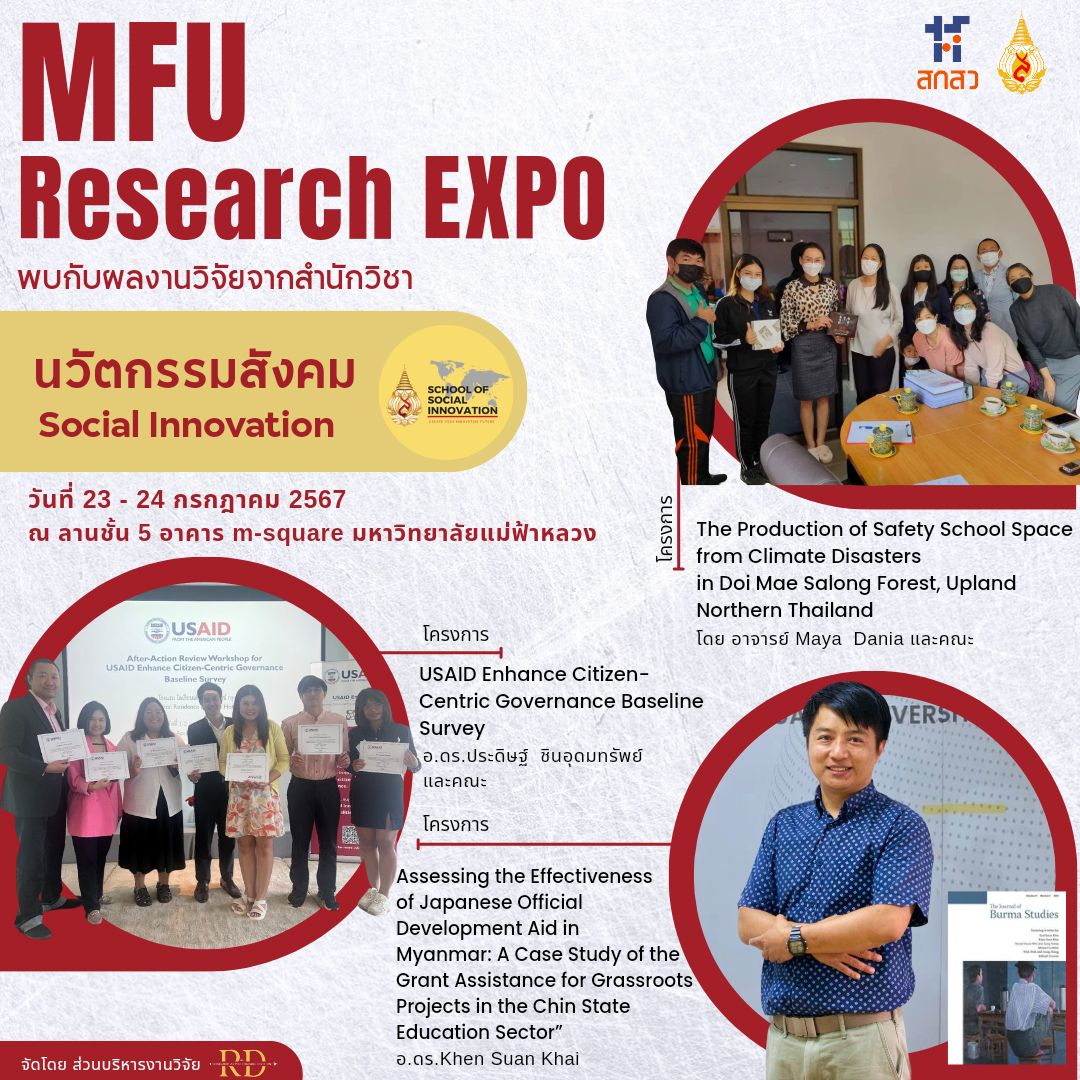#MFUResearchNews
#School_of_Social_Innovation
Chapter 14
พบกับงานวิจัยและนวัตกรรมของสำนักวิชานวัตกรรมสังคม มหาวิทยาลัยแม่ฟ้าหลวง 23-24 กรกฎาคม 2567 กับแนวคิด “นวัตกรรมสังคมสู่การขับเคลื่อนคุณภาพชีวิตที่ดี”
ประกอบด้วยผลงานดังนี้
1. The Production of Safety School Space from Climate Disasters in Doi Mae Salong Forest, Upland Northern Thailand. Ajarn Maya Dania (Head of the research project) This research is conducted in Santikhiri, a hilltop village on the highest peak in the Doi Mae Salong forest, where climate change increases the intensity and frequency of natural disasters that immensely affect the local children in the mountainousarea in Chiang Rai province, northern Thailand. There is only one secondary-level school in this forest landscape educating around 900 schoolchildren from various minority hill-tribe ethnic groups. This paper examines everyday life experiences recenteringthe village school's role as the producer of safe space for the forest children from climate disasters. School safety is a global framework for recognizing the importance of child-centered efforts in building disaster resilience for the education sector. Parameters and variables used to measure the disaster resilience of schools are adapted from the Climate Resilience Model and School Safety Model by Tonget al. (2012), covering three dimensions: 1) institutional issues, 2) physical conditions, and 3) external relationships. Lefebvre's Spatial Triad Framework is applied to dialectically interconnect dimensions to produce a safe space at the village school to protect the students from climate disaster threats. A mix-method method is applied with several techniques to collect data, including participant observation, semi-structured interviews, and content analysis. Furthermore, a scale Likert survey examined statements on school safety from educational practitioners in the rural forest area. The research argues that the production of safe space at the school is intertwined with budget allocation for disaster preparedness and response (institutional issue as l'espace concu), environmental protection campaign to create a hygienic school environment (physical conditions as l'espace percu), and support from the local community (external relations as l'espace vecu). However, the school is also two contradicting spaces of conceived and lived. Through the critical examination of the production of safe space, the schoolis a planned space of hierarchical power relations in institutional issues focusing on impacts from rapid-onset disasters. Concurrently, the forest children are still marginalized from external relationships and natural conditions' slow-onset climate change impacts.
2. USAID Enhance Citizen-Centric Governance Baseline Survey. Ajarn Dr.Pradit Chinudomsub (Head of the research project). The USAID Enhance Citizen-Centric Governance Baseline Survey is a part of the USAID Enhance Activity. The overall goal of the program is: “Strengthened citizen-centric local governance in Thailand.” Under this overall goal, the program holds three objectives 1) strengthen capacity of local governments and nongovernmental stakeholders in citizen-centric governance; 2) strengthen communications, networking, and learning among government and nongovernmental stakeholders to increase innovations that will amplify citizen voice and accountability in local governance; and 3) ensure wider adoption and/or institutionalization of successful local innovations that support citizen-centric governance. Our team from Mae Fah Luang University has been selected as a partner of the Citizen-Centric Baseline Survey in the Northern Thailand. Our responsibilities are covered 7 locales. One PAO, one municipality (Chiang Rai city) and 5 SAOs (Mae Fah Luang, Mae Prick, Wiang, San Klang, and Hua Nghom). Overall, we conducted 1,246 surveys in timely manner. Our method of data collection was the random walk method as well as asking village leaders to help identify our interviewees. We found that mostly elderly women and children are living in PAO and SAOs area while people in working age and youth working and living or studying outside the area. In contrast, in Municipality area, many people in working age and youth are living there. In addition, more than one-third of interviewees participated in decision-making process at Municipality and SAOs level while significantly less proportion participated at PAO level. However, people who participated at PAO level believed their opinions influenced the decision-making process more than those at Municipality and SAOs level. In terms of innovation, the majority believed that in can increase their access to neutral information and to express their opinions. In sum, the data received was very encouraging both in term of participation and their attitude towards innovation which is a very good sign for any future activities aiming to use innovation to create a citizen-centric governance.
3. Assessing the Effectiveness of Japanese Official Development Aid in Myanmar: A Case Study of the Grant Assistance for Grassroots Projects in the Chin State Education Sector”. Ajarn Dr. Khen Suan Khai (Head of the research project). Japanese Official Development Assistance has benefited educational development by hook or by crook. Japan has been providing grant aids for grassroots development in Myanmar for more than half a century, which has had a significant degree of effectiveness for the recipients. The Japan Grant Assistance for Grassroots Projects has specifically benefited the education sector in Chin State, Myanmar, especially in building infrastructures for schools, including providing buildings, desks, and plumbing facilities. It is suggested that there are still quite a few primary factors requiring development to access quality education in Myanmar. Based on extensive research among educators and relevant officials in Chin State, this research surveys existing issues for educational infrastructure in the state and assesses some of the challenges for educational development in the region. It also assesses how Japanese Grant Assistance for Grassroots Projects has assisted the barriers. The scope of this research is from 2015 to 2020.
……..
MFU Research Expo มีวัตถุประสงค์ดังนี้:
ภายในงานจะมีกิจกรรมดังนี้:
กิจกรรมจะจัดขึ้น ณ ห้องคำมอกหลวง และลานชั้น 5 อาคาร M-SQUARE มหาวิทยาลัยแม่ฟ้าหลวง

